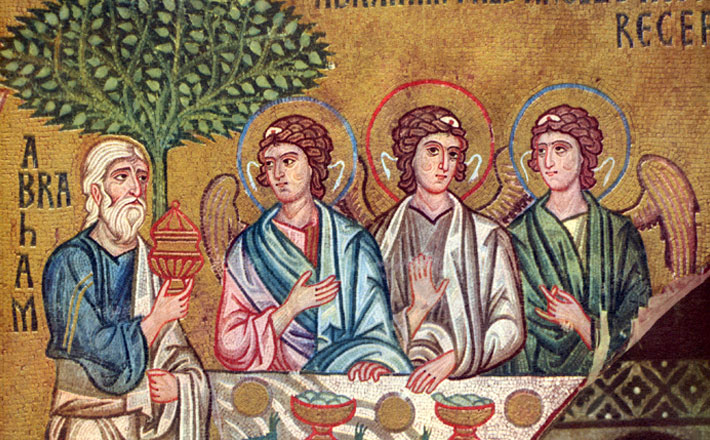Commentary on Amos 8:1-12
The week’s reading from Amos contains two different units: a prose vision report in Amos 8:1-3 and a poetic announcement of judgment in Amos 8:4-12.
(The second unit continues to the end of the chapter, but the lectionary leaves out the last two verses.) They are linked by the motif of turning festivity into lament in vv. 3 and 10.
The reading combines a stirring denunciation of economic oppression with violent images of divine judgment. Although it may be tempting to downplay the latter, this juxtaposition is characteristic of the book of Amos, and any honest attempt to engage the text must acknowledge both parts. The depictions of judgment in Amos 8 offer insight into the relationship between economic and environmental justice and the freedom of God.
The vision
Like last week, this reading begins with a vision that the prophet received. God shows him a basket of summer fruit, which might have included pomegranates, figs, and grapes, and then pronounces doom upon Israel. There is no portrayal of the judgment itself, as if it were too horrible to put into words. In fact, v. 3 begins at some remove from the unspecified disaster by describing the shrieks of grief that will replace the festive temple songs (see Amos 5:23). Only then is the cause for this lamentation revealed: a landscape strewn with vast numbers of unburied bodies. In contrast to the earlier sounds of wailing, the description ends abruptly with the interjection, “Be silent!”
What does all of this have do with a fruit basket? The vision relies on a Hebrew pun. The term for “summer fruit” is qayits, while the term for “end” is qets. (The two words would have sounded even more similar in the dialect spoken in the northern kingdom of Israel.) A few Bible translations attempt to recreate the wordplay in English, such as the New International Version: “The time is ripe for my people Israel.” Puns like this are common in biblical prophetic literature (e.g., Jeremiah 1:11-12; Amos 5:5). Still, the juxtaposition of such a pleasant, sensual image with such a grotesque, violent threat is jarring.1 The shock intensifies the sense of foreboding created by the vision.
The announcement of judgment
Like other prophetic judgment announcements, Amos 8:4-14 explains what the guilty party has done wrong (vv. 4-6) and declares what will happen as a result (vv. 7-14). The guilty party in this case is merchants who sell grain. Their self-incriminating statements in v. 5 demonstrate religious hypocrisy, as they complain of lost profits from closing shop for religious festivals (“new moon” and “sabbath”). They also brazenly declare their intention to defraud their customers. “Ephah” is a unit of measure, equal to approximately 15-20 liters.2 To “make the ephah small” means using an undersized container to measure grain, thereby giving customers less than they paid for. Similarly, “shekel” is a unit of weight (approximately 11.5 grams); to “make the shekel great” means using an excessively heavy stone to weigh payment, thereby taking more than was charged. Verse 6 refers to another fraudulent business practice, diluting the purchased grain with chaff (“sweepings of wheat”). The verse also specifies that the targets of the merchants’ oppression are the poor and needy, likely because they lacked resources or standing to challenge their exploiters. Of course, it is unlikely that the merchants would have spoken so openly about their dishonesty; the text offers a parody of a dishonest businessperson. Still, the fact that such practices are condemned Leviticus 19:35-36 and Deuteronomy 25:13-16 suggests that they did occur, perhaps frequently. And in a society where news of Ponzi schemes or subprime mortgage abuse seems almost normal, Amos 8:5-6 doesn’t sound all that exaggerated.
In response, God threatens a variety of calamities in vv. 7-14. They will affect not just the corrupt merchants but all of Israel, suggesting that the society at large bears responsibility for creating the circumstances in which such actions could prosper. The fact that God swears an oath (v. 7) underscores the seriousness of the divine intention to punish these crimes. Verse 8 appears to describe an earthquake (see Amos 1:1, 9:1), comparing the seismic disturbance to the rising and falling water of the Nile River during its flood, and verses 9-10 depict further cosmic disturbance. Many contemporary readers of the Bible many find the claim that God causes natural disasters to punish human sins unhelpful. At the same time, this verse makes a crucial point about connections between economic and environmental exploitation. Corporate fraud, exploitation of the poor, and ecological disruption are all consequences of the drive to maximize profit at any costs. People who live on the margins often suffer disproportionately from environmental abuse.
The language of vv. 11-12 appears at first to continue the series of natural disasters, but the threat is actually “a famine … of hearing the words of the LORD.” In ancient Israelite religion, prophecy was the primary channel through which God was expected to communicate. Because the people of Israel have rejected the warnings of prophets like Amos (Amos 2:12; 7:12-13), they will lose access to prophecy when they desire it (see 1 Samuel 3:1; Psalm 74:9). This frightening possibility reaffirms the freedom of God from any human manipulation. While Christians rightly celebrate God’s definitive self-revelation in Jesus Christ, it is important to recognize this as a gift that shouldn’t be taken for granted. Pop theology tritely claims that God never stops speaking, but humans sometimes stop listening. On the contrary, God does not owe us any revelation and may sometimes withhold it from us for reasons known only to God.
Notes:
1 See Yvonne Sherwood, “Of Fruit and Corpses and Wordplay Visions: Picturing Amos 8.1-3,” Journal for the Study of the Old Testament 92 (2001): 5-27.
2 Phillip J. King and Lawrence E. Stager, Life in Biblical Israel (Louisville: Westminster John Knox, 2002), 200; Marvin A. Powell, “Weights and Measures,” Anchor Bible Dictionary 6: 901-2.


July 17, 2016